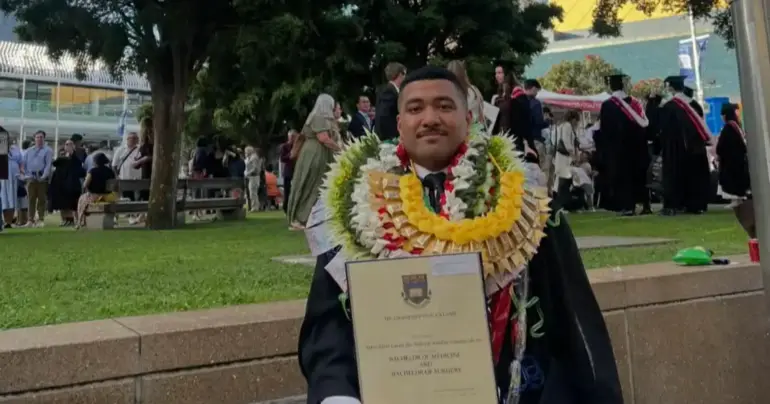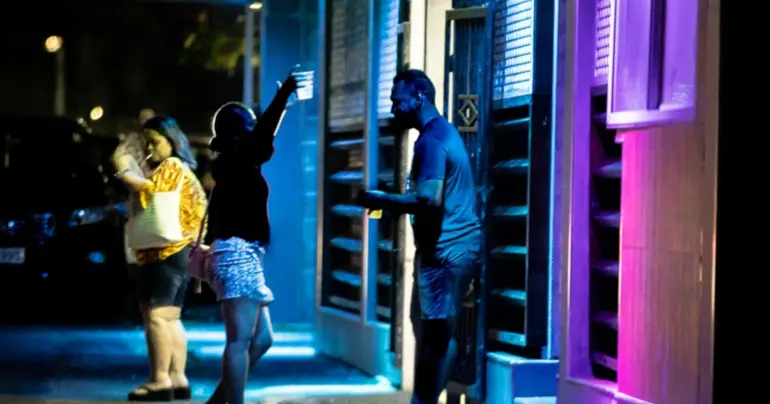Guard duty: Parenting through fences
 By Sulamanaia Manaui Faulalo
•
24 February 2024, 9:00PM
By Sulamanaia Manaui Faulalo
•
24 February 2024, 9:00PM
It’s 8 am on a Tuesday, and a unique daily routine unfolds outside St Mary's Primary School, where parents gather not just to drop off their children but to stay and wait for the school day to come to an end.
A police officer directs the morning traffic. Cars line up as parents drop off their children.
Among them, a stream of girls in blue and white dresses flock towards the school entrance—an everyday sight in any Samoan primary school. Most parents drop their children off and leave for work, but a group of parents have decided to handle it differently.
For many Samoans, waiting for their children outside schools has become a tradition.
For these parents, they say they are doing this for the sake of their children, but their actions are not always welcomed.
"It's my job. My sisters need me here," said Rosa Norman, 22, soft-spoken and kind, plays a motherly role here, not as a parent but as the eldest of six siblings.
Living in Falefa, she has a two-hour bus ride to school. And although she's been up since three o'clock, she doesn't complain.
The morning rush ends and the school building fills up with children. A teacher locks the gates, securing the children in and parents out.
On the footpath, six women from different walks of life gather. In the shade of a tree, they share smiles and nods. A Ie lava lava is spread on the hard pavement, making it their day's base.
Kali Misa is a mother of three and is here for her granddaughter, five-year-old Nua.
It's Nua's first term in school, and Kali Misa has been around since day one. The first day, her granddaughter was nervous, she says.
"She was trying to hang on to my pants when I tried to walk out from class,"
Four weeks later, that is no longer the problem. Similar to the others, she wants to be close if something happens.
One hour until the lunch break - the best part of the day for the gathered mothers - Kali Misa heads for the nearby Savalalo market. She buys two hot dogs with tomato sauce and a chocolate muffin for the lunchbox.
Rosa Norman has already packed hers. She made it shortly after waking up: fried eggs, sausages, and noodles not only for her sisters but for all her siblings.
Another parent shows up, even though their child's lunch is already inside. For Moni, there has never been any doubt of being close to the daughter.
"This is how it was for us when we grew up. So now that we have kids, it's what we're supposed to do," said Moni.
Getting a proper lunch for the kids could be a challenge, though, not the least for the money it costs.
"Say 20-25 years ago, when I was in school, you could have lunch for one or two tala, and it would be good for you. Now, with the cost of living here, it is different."
The clock has turned, its 10.30 am. A teacher shows up, unlocks the padlock, and the parents quickly line up.
"Like a herd of cattle trying to get to one place," Rosa Norman laughs.
Kali Misa rushes towards her granddaughter's classroom and starts to prepare for the meal. Moments later, the five-year-old shows face. Kali Misa takes out a tea towel and combs Nua's hair. The girl immediately goes for the muffin.
The lunch break is just thirty minutes. Time is precious.
A striking bell marks the end of the break and sends the parents back to the streets. It now turns out they are not only there to support their kids but to keep them safe.
Boys in their upper teens frequently roam the area, possibly selling drugs, according to some of the mothers. A sight that Kali Misa says makes her sad.
Rosa Norman pulls out her phone and shows photos of some of her siblings: a 21-year-old who works as a fire dancer, a 15-year-old who does Tiktok-videos, and a 14-year-old in his St Joseph school uniform.
There are six altogether, and all are helping out so their parents can become church ministers.
The parents gathering on the street is a new sight. Last year, they were allowed to wait within the school premises, but since the beginning of the term, they have been forced outside. According to the principal, it is done because a building needs to be renovated, which can take up to two years. After a month of sitting outside, patience is already waning among the parents. The friction is fueled by neighbouring stores complaining about the parent's presence.
"The school board's arrogance disturbs me," says one parent.
"The school never held a meeting with all the parents - there's a lack of communication".
Despite being kicked out, the parents refuse to leave the school's proximity, ignoring the principal's plea to go home.
"Sometimes our kids are not comfortable with the teachers," one parent explains.
It's not so much of distrust towards individual teachers, the parent adds; it is more about the trauma they experienced while in school back in the day.
"We grew up in a time where corporal punishment was one of the disciplinary actions that was basically the way of things then. We have learnt to not raise our kids the way we were raised, to give them the opportunity to express themselves. And when other people do not understand how our kids express themselves, and that lack of understanding can lead to dispute,"
Epifania Sila holds on to the fence while hoping to get a glimpse of her daughter. She says she is not bothered about being kicked out.
"They said it'll only be like this for a couple of months", she says.
Four teenagers stroll by, casually eying the mothers.
"Look at them," Kali Misa says. "What the hell are they doing, walking around town doing nothing and selling, I don't know."
She nods towards the teenagers, saying it is the same type of youngsters she has seen dealing drugs around the market.
"They are doing something fishy, we all know that. They should be in school, they should be in their houses."
Unlike most other relatives, she will only do this until April. Her daughter has announced she is moving to New Zealand, taking Kali Misa's four grandkids.
"I feel kind of sad," said Kali Misa. "But many move to New Zealand to further the education for their children,"
She herself was brought up in Samoa but went to business school in Long Beach, California.
The school day is ending, and more and more parents begin to fill up the sidewalk, a scene similar to the morning, only this time the gates aren't open.
During the whole day, no schoolchildren had to seek any of their waiting relatives outside. A successful outcome in one aspect, although none of the mothers seem regretful for staying there anyway.
"If they come out looking for me and I am not here, they will cry and I don't want that," said Rosa Norman.
The end-of-school bell rings, and the parents who have filled the sidewalks stream in to collect their children.
Kali Misa gets her granddaughter and waits for a car to pick them up.
Some days, she goes home to play volleyball close to her house. But today, she doesn't feel like doing that, she says.
"I am going to take a nap. I have been sitting here all day,"
 By Sulamanaia Manaui Faulalo
•
24 February 2024, 9:00PM
By Sulamanaia Manaui Faulalo
•
24 February 2024, 9:00PM











